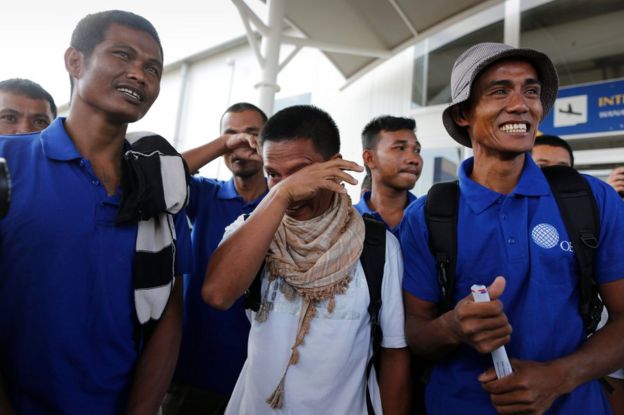
Audio By Carbonatix
A group of sailors who were held hostage by Somali pirates for nearly five years survived in part by eating rats, one survivor has told the BBC.
Filipino sailor Arnel Balbero said they were also only given small amounts of water and felt like "the walking dead" by the end of their ordeal.
The 26 sailors were seized on board their ship in 2012 and were eventually taken to Somalia.
They were freed on Saturday, reportedly after a ransom was paid.
The sailors were from China, the Philippines, Cambodia, Indonesia, Vietnam and Taiwan.

The sailors, including Arnel Balbero (right), flew to Kenya after their release
Mr Balbero was among the crew of the FV Naham 3 when it was captured by Somali pirates south of the Seychelles. One crew member was killed during the capture, according to non-governmental organisation Oceans Beyond Piracy.
A year later, the ship sank and the crew were brought onshore in Somalia. Two sailors subsequently died of illnesses.
Mr Balbero told the BBC that the last four and a half years had left him and his compatriots "like walking dead".
Asked how the pirates treated them, he said: "They give us small amount of water only... We eat rat. Yes, we cook it in the forest."
"[We] just eat anything, anything. You feel hungry, you eat."
He also spoke of their difficulties adjusting to life after their ordeal, saying: "I don't know what is... outside of this world when this finish, so it's very hard to start again."
AP
There were originally 29 men but one died during the capture of their ship and another two died from illnesses in captivity
The group are believed to be some of the last remaining captives held by Somali pirates, after a wave of hijackings in the mid-2000s.
Piracy off the coast of Somalia, usually for ransom, has reduced significantly in recent years, in part because of extensive international military patrols of the most vulnerable areas.
CHENG-YUAN TSAI
Taiwanese chief engineer Shen Jui-chang was seen in a recently released clip of the hostages, filmed in 2014
Separately a clip has emerged of the survivors, which appeared to have been taken in 2014 by the pirates amid negotiations as proof that the hostages were still alive.
The clip, released by a Taiwanese lawmaker who took part in the negotiations, shows the group of men looking thin and haggard and surrounded by masked gunmen.
It then cuts to a man identified by Taiwanese media as Shen Jui-chang, the Taiwanese chief engineer of the hijacked ship.
In the clip, Mr Shen says in Mandarin that the men were only given a litre of water a day to drink despite the heat. "There is no water, there is no food," he said, adding that "every one of us has some kind of illness".
"The pirates won't get medicine for you, they say that they don't have money to buy medicine. That's how two young men have already died for nothing," he says.
Taiwan's foreign affairs ministry said the men were freed after a ransom was paid by the ship's owner as well as groups contracted to negotiate with the pirates, Taiwanese media reported.
The ship was Omani-flagged but owned by a Taiwanese company.
Latest Stories
-
Ghana is rising again – Mahama declares
4 hours -
Firefighters subdue blaze at Accra’s Tudu, officials warn of busy fire season ahead
5 hours -
New Year’s Luv FM Family Party in the park ends in grand style at Rattray park
5 hours -
Mahama targets digital schools, universal healthcare, and food self-sufficiency in 2026
5 hours -
Ghana’s global image boosted by our world-acclaimed reset agenda – Mahama
5 hours -
Full text: Mahama’s New Year message to the nation
5 hours -
The foundation is laid; now we accelerate and expand in 2026 – Mahama
6 hours -
There is no NPP, CPP nor NDC Ghana, only one Ghana – Mahama
6 hours -
Eduwatch praises education financing gains but warns delays, teacher gaps could derail reforms
6 hours -
Kusaal Wikimedians take local language online in 14-day digital campaign
7 hours -
Stop interfering in each other’s roles – Bole-Bamboi MP appeals to traditional rulers for peace
7 hours -
Playback: President Mahama addresses the nation in New Year message
8 hours -
Industrial and Commercial Workers’ Union call for strong work ethics, economic participation in 2026 new year message
9 hours -
Crossover Joy: Churches in Ghana welcome 2026 with fire and faith
10 hours -
Traffic chaos on Accra–Kumasi Highway leaves hundreds stranded as diversions gridlock
10 hours

